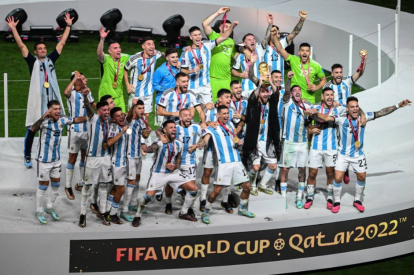What we learned from Qatar 2022
The tournament, albeit incredible on the field, cost more than anyone could have imagined: in money, time and lives.

iStock.
When Argentina lifted the trophy, the World Cup officially came to an end. However, not everything that was lived, felt and learned during these weeks of intense emotion is over. The FIFA World Cup Qatar 2022 was highly controversial from the moment its venue was announced on Dec. 10, 2010. Aside from the social and human rights issues, FIFA put the World Cup in the hands of an Arab country for the first time, and it is remarkable that the logistics and organization ran smoothly. In this way, both FIFA and Qatar succeeded in delivering the world a great spectacle.
As always, the excitement of the fans of the participating countries provided the magic that these international competitions always do.
In sporting terms, it was a World Cup full of surprises, from the early elimination of Germany, Brazil and Mexico to the emergence of Morocco, whose fourth place finish captured the hearts of fans. Morocco represented Africa in the best possible way, after several years of strategic development. Coach Walid Regragui has enjoyed success wherever he has been, first leading a mid-table Moroccan club, FUS Rabat, to its only league title. The Royal Moroccan Football Federation also deserves credit for the success of the Atlas Lions. After 30 years of losing, it revitalized the country's soccer infrastructure. In 2009, the federation inaugurated its national soccer academy, which began to train soccer players that we now see having success on the world's greatest stage. The investment of the last decade has begun to pay off and the team, which is also the champion of Africa, left fans thrilled with their performance in Qatar.
Other memorable performances from the tournament were Spain's 7-0 thrashing of Costa Rica and Saudi Arabia's victory over Argentina, stories that will live on in their respective countries despite the lack of hardware to show for them. On the field, it was a World Cup that rewarded balanced teams over those that leaned too heavily towards attacking or defense.
Eight coaches were relieved of their duties following the World Cup, including Luis Enrique, formerly of Spain, and Gerardo Martino, formerly of Mexico.
The final saw two teams, Argentina and France, that were as balanced as they come. They designed their game plan according to their opponent, always generating different ways to attack. France has reached two consecutive finals. Four years ago in Russia they took the glory, and now they are the runners-up. As for Argentina, their triumph leaves many questions on the table for soccer lovers, starting with these two: Has Messi surpassed Maradona? And if so, is he the greatest player of all time?

plantilla foto (29)
The 2022 World Cup not only produced good competition, but it also set the tone for the implementation and modification of new technologies such as VAR and digital offside tracking. Another revelation was the new ball,
Al Rihla ("the journey" in Arabic), which has a chip inside it that allows various data to be taken and transmitted, such as shot speed and distance traveled. It was a giant leap for soccer's transition into the digital era, which all can agree must be carried out in a responsible and planned manner, improving the game without neglecting the human factor.
The three hosts of the 2026 World Cup, Mexico, the United States and Canada, are already preparing and will have to continue on the path of innovation if they want to shine at the event.
Canada returned to the World Cup in 2022 after more than three decades, and they excited fans with their play. They have a world-class player in Alphonso Davis, and the world will see how the 22-year-old improves in the coming years. The U.S. has the MLS, an improving league, and has been investing millions of dollars for decades. In the women's team, the results are indisputable. For the men, it is a project that still needs to grow. Finally, for Mexico, these next years will be integral for the Mexican Soccer Federation to set and achieve new goals. New faces have led El Tri to the brink of success. In 2026, the world will see if they are ready to take the next step.
Despite not winning a single match, Qatar were winners. The country wanted to become better known worldwide and, by hosting the most popular sporting event on the planet, succeeded. Organizing the tournament cost more than anyone could have imagined: in money time and lives. But on the night of the final, in the midst of Argentina's celebrations, with the fans' chants, the medals, the fireworks and so on, it would have been difficult for the Qataris not to feel a sense of accomplishment.
Recommendation





















